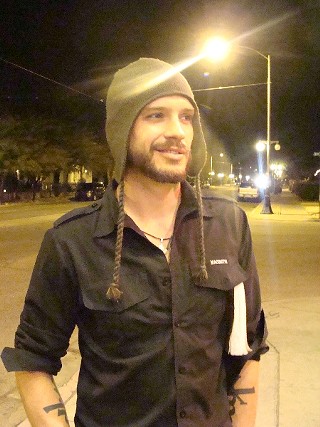Poet Logan Phillips is one of five Arizona artists (three from Tucson) to receive a 2012 Artist Project Grant from the Arizona Commission on the Arts. Phillips' project is The Sonoran Strange, a multimedia theater work he will perform with his group Verbo•bala, which includes DJ Emmett White and video artists Moisés Regla and Adam Cooper-Terán. For more information, visit www.verbobala.com.
What is your project about?
It is hard to describe, but for the grant, we described it as a "surrealist trip across the Arizona Centennial." But really, Verbo•bala as a group was founded on one of the ideas that borders are points of contact just as they are lines of division. So we explore borders not only as geopolitical borders, but also the borders that run through our own lives and also our own social circles. We've been doing that since 2007, and The Sonoran Strange is in some ways a manifesto to say, "This is where we're from. It's not Arizona. It's not Mexico. It's not the United States. It's North America in the Sonoran Desert bioregion." What's called the Southwest in the United States is one of the most-interesting areas in the whole hemisphere. It's kind of the end game in the whole manifest destiny. One of our richest state resources is irony, because we're the fastest-growing state in the nation, and everyone knows the water is going to run out.
How did you get that across in the grant?
I wrote, "We take original imaginative leaps. ... What if Mexico's wailing boogey woman La Llorona one day was heard moaning on a canal in Scottsdale? What if the Catalina Mountains outside Tucson dreamed of one day jumping the border of the horizon to become thunderheads? What if the Apaches had won? What if we had sent the saguaros to boarding school to Pennsylvania? What if the snowbirds didn't come home to roost? What if the tumbleweeds settled down? What if sand shoots from the sprinklers? What if the water runs out? These are the questions that keep us up at night. We ask them to provoke dialogue about what it means to be an Arizonan in the state's second 100 years."
How will we see that in a performance?
What the grant technically is for, is to turn this full book-length work of poems I've been working on since 2007 that is The Sonoran Strange into a performance.
The idea is to go into open spaces and other places, not traditional spaces?
Right. The Greek proscenium theater that all of our theaters are based on has that fourth wall between the audience and the performers, and that relationship goes directly against what we're trying to develop as a group. And so for years, Verbo•bala has been trying to get out of theaters, but it is really hard when you're tied to video projection. So with Sonoran Strange, we're going to build a structure that will receive the video, and now we finally have the resources to have our own video projectors (in) galleries, open spaces, clearings in the desert. What's important is that when we perform in a round or an open space, we're on the same level as the audience, and that's what makes storytelling accessible.
When will we see the first production?
For the centennial on Feb. 14, we'll be reading the work here at Studio ONE (197 E. Toole Ave.) at 8 p.m. There's a $5 suggested donation. That's going to be the debut of a lot of the work. I believe that while the art of poetry is a very solitary art, it also creates community when it is shared. So we'll show it as a work in progress, so that later as it gets developed, people can come back and see what it turns into.
I imagine it will be different each time, because it will also be in a new space.
Absolutely. And one of our goals is nonlinear storytelling—no beginning, middle and end. No clean narrative or nice narrative arc with a big moment of catharsis. We're interested in developing to the spaces and the crowds where we are. So it will be different every time. And we approach it as a band would, and our set list changes, so it will never be the same twice.
I love the title, because it goes to the heart of how a lot of us feel now.
It's this surrealism that is both heartbreaking and heart-expanding at the very same time. It drives you to tears. Look at the ethnic-studies debate. Migration. Look at any sunset on any day from downtown Tucson or any place else, and it is just so ... so ...
It makes no sense.
It makes no sense. There is no rational way of understanding it. So how do we deal with it?





